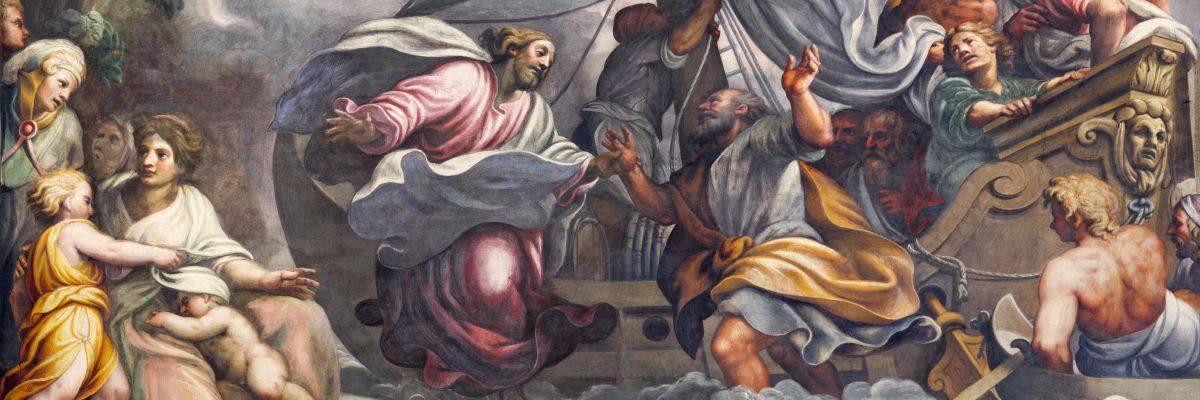
With great interest, I recently watched a lecture delivered several months ago by a rather well-known priest who works with marginalized persons in one of America’s largest cities. He spoke about our need for “a better God than the one we have.” We “have settled for a partial, puny God.”
I assumed that the priest didn’t really think that God himself could be improved, that the Creator of the universe was too puny; rather, I figured the priest was preparing to show that people fail to see God’s true greatness due to their own limits. It’s a common and potentially effective rhetorical device that can grab attention and set up proper explanations and distinctions.
“Any thought of God is a lie that does not comfort us,” he went on to assert. I became increasingly concerned with the conflict between what this priest was saying and what Scripture and Catholic Tradition teach us. Rather than return from rhetorical flourishes to solid ground, he was further distorting the truth. And it got worse.
He continued: “Find me a mystic who believes in hell, and you’ll find a non-mystic.” If one finds a mystic who “begrudgingly” admits there is a hell, listeners were told, that mystic will also quickly say hell is empty. This is apparently so because hell is inconsistent with who God really is. It is the “lesser,” more “realistic” God who demands justice. According to this priest, we need a “better” God than that.
I’ve had no luck finding any Catholic saints or mystics who support this claim. The list of those recognized Christian mystics who affirmed not only the existence of hell but also the abundance of souls that populate it is, however, substantial. Among these are Bl. Anne Catherine Emmerich, St. Theresa of Avila, St. Catherine of Siena, St. John Bosco, and St. Maria Faustina Kowalska.
The greatest mystics in Church history consistently warn us of the eternal consequences of sin and the need to not rely on private revelation. In St. John of the Cross’s classic work Ascent of Mount Carmel, he explores in profound detail the ways the devil may deceive visionaries and mystics even when they have had genuine experiences of God. Their interpretation of these experiences can be misleading when mixed with their own passions and ideas. These experiences can even become a source of their ruin. St. John repeatedly warns of the dangers the mystic faces and that “revelations or locutions which are of God . . . must never be believed or trusted blindly” (Book II.9).
It is surreal to live in a time when so many Catholic Christians openly and blatantly contradict what Our Lord, his earliest followers, and the Church through the centuries have consistently affirmed. Speaking of his betrayer, Jesus said, “It would have been better for that man if he had not been born” (Matt. 26:24). The stern warnings of judgment found in many of Jesus’ parables are unmistakable and frequent: “These shall go away into eternal punishment” (Matt. 25:46; see also Luke 10:13-15). Similar references are not hard to find in the New Testament letters and, of course, the book of Revelation (e.g., Romans 2:5-10, Hebrews 10:26-28, 2 Peter 2:4, Revelation 20:14).
The Catechism of the Catholic Church also summarizes the Catholic tradition regarding these many verses of Scripture, insisting that they “are a call to the responsibility incumbent on man to make use of his freedom in view of his eternal destiny” (1033). “The teaching of the Church affirms the existence of hell and its eternity” (1035).
As to universalist claims—the belief that there is no hell or that it is not eternal—the Church has spoken unequivocally on this matter of doctrine. As my fellow Catholic Answers contributors have well and recently argued (see here, for example), hell is real and eternal, and the Magisterium has left no room for doubt on the matter.
If the various warnings about judgment and hell call us to proper use of our freedom “in view of our eternal destiny,” does not a confident denial of the very existence of hell lead us to a false sense of security? If this priest is right—the notion of a “God” who demands justice is a “puny” one, and we need a “better” God who only brings us comfort—does this not imply that we can be certain of our future destiny and that we have nothing to worry about?
Such “certainty” is hardly distinguishable from the vice of presumption. Thomas Aquinas explained that the sin of despair, or total hopelessness, is a failure to acknowledge the mercy of God. Presumption, on the other hand, “despises the Divine justice” (Summa Theologiae II-II.21.1). The virtue between these failures is hope. Presumption is immoderate hope. It denies the difficulty of this life’s journey toward God and leads to disproportionate confidence in one’s standing before God, despite the sinful realities of one’s life.
In fact, Aquinas even believed that presumption is the meaning of the “sin against the Holy Spirit” (Matt. 12:30-32) because “by presuming thus a man removes or despises the assistance of the Holy Spirit, whereby he is withdrawn from sin.” In other words, by moving from hope to presumption, one lives with the illusion that he is accepted by God even if he does not pursue the path of repentance and holiness.
Our lives in this world are clearly in process. Man is homo viator, “man on the way.” It is a sad development when we cease moving toward our heavenly home because we presume that it is a certainty that we shall arrive there. Such a frame of mind is contrary to Scripture, Tradition, and what we all know deep down inside is true every moment of our lives. We must continue to look to Christ or, like Peter, we will begin to drown (Matthew 14:22-33).
Undoubtedly, this renowned priest has much to teach us regarding how to serve with the marginalized. His words encouraging others to embrace a “better God” than one who requires justice, however, are alarming. Rather than roam into the darkness of false mystical notions of a “better” God, we ought to remain in the light of the God who is: “I am Who I am” (Exod. 3:14).



